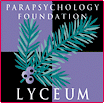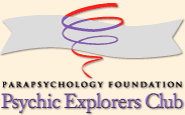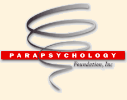 |
 |
|
PF Lyceum Blog #1, September 23rd, 2005 by Carlos S. Alvarado, Ph.D. While many definitions of parapsychology have been offered in the past, those of you interested in this fascinating field are probably already aware that parapsychology is the scientific study of what has been referred to in the past as psychic phenomena. (Click here for some "Introductory Readings".) What characterizes the field is the use of the scientific method to learn about psychic phenomena. While the so-called movements of occultism and the “New Age” focus on personal experiences, and different forms of revelation, parapsychologists focus their efforts on the collection of empirical data through laboratory and case studies procedures. (Click here for our bibliography on the subject and click here our pamphlet Brief Manual for Work in Parapsychology.) Parapsychologists study many different phenomena (click here to see a list prepared by PA President Dean Radin.) This includes extrasensory perception (ESP) and psychokinesis (PK). ESP refers to information obtained by a person without the apparent use of sensory means of communication. It includes information about the thoughts and emotional states of persons (telepathy), objects or events (clairvoyance), and future events (precognition). PK refers to actions exerted on our environment, what has popularly been referred to as the effect of “mind over matter.” In addition to phenomena such as moving objects, this has been considered to include effects on electronic and computer technology, photographic film and organic matter. The latter includes healing and affecting the growth of plants. In addition, there are many phenomena that, while possibly related to ESP and PK, may involve different processes. These include:
The literature on these topics is immense, as seen in the samples presented in the Parapsychology Foundation’s Bibliographies. There are many unexplained phenomena that have been recorded through time. (For example, see The Roots of Consciousness.) The world is full of anomalies. But parapsychologists do not study everything that is unexplained, strange, or plainly “weird.” As stated by Dean Radin: In spite of what the media often imply, parapsychology is not the study of anything considered weird or bizarre. Nor is parapsychology concerned with astrology, UFOs, searching for Bigfoot, paganism, vampires, alchemy, or witchcraft. (Click here for some readings on UFOs and religious phenomena.) I may add that parapsychologists do not generally study a variety of misunderstood psychological phenomena such as dreams, hypnosis, hallucinations and multiple personality (now called dissociative identity disorder). While these phenomena may include ESP or other parapsychological experiences, they are generally left to psychologists and psychiatrists to study. Perhaps a good way to limit the subject matter of the field is to put emphasis on phenomena that suggest new or presently misunderstood ways to interact with our environment. So phenomena such as ESP and PK may be seen as examples of such interaction in terms of information acquisition and action on the physical world. Other phenomena such as apparitions, healing, mediumistic communications, poltergeists, and NDEs may be also conceptualized in these ways, even if we do not understand the specific processes behind their manifestation. We need to be careful at this stage to avoid definitions of the field based on theoretical statements such as those presupposing the nonphysical nature of the mind or of a communication process, the action of particular physical processes, or discarnate agency (for definitions, click here). All these ideas are explanatory constructs that deserve empirical exploration but that should not define the field until we reach some sort of consensus. Of course these issues are controversial and you will find some parapsychologists who will challenge my attempt to define the field without recourse to particular theoretical constructs. The situation in the field of psychology, for example, is similar. Depending on the theoretical orientation of the psychologist writing a textbook, you will get definitions of psychology based on social, cognitive, physiological or behavioristic criteria. Such richness, or confusion, depending on your view, characterizes the complex issues involved in the study of human beings, including parapsychology. Click here for Past Blogs |
 |

|
 www. parapsychology. org |
||